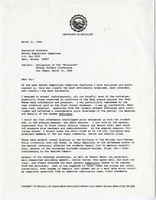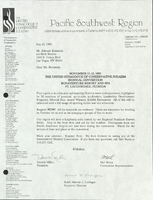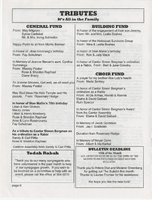Search the Special Collections and Archives Portal
Search Results

Transcript of interview with Rabbi Sanford Akselrad by Barbara Tabach, October 29, 2014
Date
Archival Collection
Description
Sanford Akselrad is the rabbi at Congregation Ner Tamid. In this interview he describes his rabbinical training, coming to Las Vegas, and the growth of the congregation.
More inclined in his youth to pursue a career as a scientist than rabbi, Sanford Akselrad (1957- ) became the rabbi at Congregation Ner Tamid in 1988. Turning his tenure, Rabbi Akselrad has lead the congregation through its move from Emerson to Street to its permanent home on Green Valley Parkway and I-215 and shares a fun story about buying desks and chairs from the Clark County School District. He talks about many of the milestones including: Project Ezra which he started during the 2008 recession to help Jewish community members find jobs; the NextGen program which was initiated to bring young adults in their twenties and thirties back to the temple. For over twenty years Rabbi Akselrad was a member of the board of the Nevada Governor?s Council on Holocaust education, a topic that was the focus of his rabbinical thesis. He was the founding president of the Clark County Board of Rabbis and has served on the boards of the Jewish Federation of Las Vegas, Jewish Family Services, and the Humana Hospital Pastoral Advisory Board. He was also the chair of the Federation?s Community Relations Council (CRC). Rabbi Akselrad is a board member of the Anti-Defamation League Nevada region office and the Interfaith Council of Southern Nevada. Sanford Akselrad was born on October 6, 1957 in Oakland, California and raised in Palo Alto. He attended the University of California, Los Angeles and then went to graduate school at the Hebrew Union College Jewish Institute of Religion. He spent the first year of his graduate program in Israel, the next two in Los Angeles, and the final two years in Cincinnati, Ohio. Rabbi Akselrad met his wife Joni in Reno, Nevada and married her during his third year of rabbinical school. The couple has two children, CJ and Sam. After his ordination in 1984, Rabbi Akselrad was associate rabbi of Temple Israel in Columbus, Ohio, one of the largest Reform congregations in the Midwest. His choice of career was inspired by his father, Sidney Akselrad, who was a prominent rabbi involved in social justice issues and the Civil Rights Movement. Sanford Akselrad has followed his father?s example of community involvement, both in Las Vegas and on a national level: he served on the board of the National Conference of Community and Justice (NCJJ), he was chair of the NCJJ's Inter-faith Council, and he is active in the Union of Reform Judaism (URJ).
Text

Letter to the Executive Director of the Nevada Humanities Committee from Donald E. Carns evaluating the Holocaust Nevada Student Conference, March 21, 1984
Date
Archival Collection
Description
Letter from Donald E. Carns of the Department of Sociology at UNLV to the Nevada Humanities Committee evaluating the Holocaust Nevada Student Conference held in Las Vegas, March 14, 1984.
Text

Transcript of interview with Marla Letizia by Barbara Tabach, August 26, 2015
Date
Archival Collection
Description
In this interview, Letizia discusses her career, and breaking gender barriers in both broadcasting as well as in advertising. She also talks about how her family ended up settling in Las Vegas, and the evolution of her relationship with Judaism from childhood to adulthood, eventually leading to her leadership roles with Congregation Ner Tamid as well as Jewish Federation, where she is on the Board of Directors.
Marla R. Letizia is the founder of Big Traffic Mobile Billboards in Las Vegas, Nevada. The company operates mobile billboard advertising trucks and employs brand ambassadors to carry WOBI? walking billboards for retail, gaming, and entertainment clients such as Caesars entertainment, Tropicana, and Cirque Du Soleil. Letizia founded Big Traffic in 2001 after leaving a successful broadcast journalism career to raise her two children. She met her husband, Tom Letizia, while working at KLAS-TV Channel 8 as an assistant production manager. She later became the first female director of live television news broadcasts in Las Vegas at Channel 8. She also developed a TV show called "Las Vegas Turnaround" and a syndicated production called "The Parenting Network." Letizia grew up in Las Vegas, and is a former president of Congregation Ner Tamid and a founding member of the board of trustees of the Meadows School in Las Vegas. In this interview, Letizia discusses her career, and breaking gender barriers in both broadcasting as well as in advertising. She also talks about how her family ended up settling in Las Vegas, and the evolution of her relationship with Judaism from childhood to adulthood, eventually leading to her leadership roles with Congregation Ner Tamid as well as Jewish Federation, where she is on the Board of Directors.
Text

Transcript of interview with Mindy Unger-Wadkins by Barbara Tabach, October 28, 2015
Date
Archival Collection
Description
In this interview, Unger-Wadkins discusses growing up in Las Vegas? close-knit Jewish community in the 1960s and 1970s, and involvement with various Jewish youth organizations and activities. She also describes her career in public relations, reflecting upon the unique challenges faced when interacting with the public, and with politics, in her positions. Unger-Wadkins ends by describing her current work in land development, particularly the history of the Three Kids Mine and the technical and political process of ensuring the land is suitable as a residential area.
Text

Transcript of interview with Marc Ratner by Barbara Tabach, August 23, 2016
Date
Archival Collection
Description
Marc Ratner moved to Las Vegas when he was in the seventh grade in 1957. His father became owner of a retail beauty supply business. It also was about the time Marc became a bar mitzvah. The Ratner family belonged to Temple Beth Sholom, as did everyone at the time, and a favorite memory he recalls is of sneaking a glimpse of crooner Eddie Fisher and actress Elizabeth Taylor getting married there. While growing up, Marc showed no particular interest in being a star athlete. He played little baseball and participated in track as a long jumper. Nevertheless, on the day of this oral history interview, Marc is sitting in his office surrounded by sports memorabilia. It is all a testimony, a museum highlighting his decades of officiating and regulating sports events. His stories include newsworthy boxing episodes that ranged from the infamous ?Fan Man? parachutist incident in 1963 during the Evander Holyfield vs Riddick Bowe fight at Caesars and the 1997 ?Bite Fight? when Mike Tyson took a bite out of Evander Holyfield?s ear. v In 2016, Marc was inducted into the International Boxing Hall of Fame, an extraordinary honor for a nonparticipant. He has long been a fan of the sport and talks about the first fight he ever attended, becoming a ring inspector in 1985 and then starting a new phase of his career in 2006, as Vice President of Regulatory Affairs for the Ultimate Fighting Championship [UFC]. In addition, Marc has dedicated much his life blowing the whistle at high school and college sports: he?s officiated on the football field for several conferences, bowl games and mentors would-be officials. He served as Nevada State Athletic Commission executive director for two decades. Among his community involvement is serving on the board of Jewish Family Services Agency. In 1997 he was honored by the National Council of Christians and Jews. Marc Ratner moved to Las Vegas when he was in the seventh grade in 1957. His father became owner of a retail beauty supply business. It also was about the time Marc became a bar mitzvah. The Ratner family belonged to Temple Beth Sholom, as did everyone at the time, and a favorite memory he recalls is of sneaking a glimpse of crooner Eddie Fisher and actress Elizabeth Taylor getting married there. While growing up, Marc showed no particular interest in being a star athlete. He played little baseball and participated in track as a long jumper. Nevertheless, on the day of this oral history interview, Marc is sitting in his office surrounded by sports memorabilia. It is all a testimony, a museum highlighting his decades of officiating and regulating sports events. His stories include newsworthy boxing episodes that ranged from the infamous ?Fan Man? parachutist incident in 1963 during the Evander Holyfield vs Riddick Bowe fight at Caesars and the 1997 ?Bite Fight? when Mike Tyson took a bite out of Evander Holyfield?s ear. v In 2016, Marc was inducted into the International Boxing Hall of Fame, an extraordinary honor for a nonparticipant. He has long been a fan of the sport and talks about the first fight he ever attended, becoming a ring inspector in 1985 and then starting a new phase of his career in 2006, as Vice President of Regulatory Affairs for the Ultimate Fighting Championship [UFC]. In addition, Marc has dedicated much his life blowing the whistle at high school and college sports: he?s officiated on the football field for several conferences, bowl games and mentors would-be officials. He served as Nevada State Athletic Commission executive director for two decades. Among his community involvement is serving on the board of Jewish Family Services Agency. In 1997 he was honored by the National Council of Christians and Jews. Marc Ratner moved to Las Vegas when he was in the seventh grade in 1957. His father became owner of a retail beauty supply business. It also was about the time Marc became a bar mitzvah. The Ratner family belonged to Temple Beth Sholom, as did everyone at the time, and a favorite memory he recalls is of sneaking a glimpse of crooner Eddie Fisher and actress Elizabeth Taylor getting married there. While growing up, Marc showed no particular interest in being a star athlete. He played little baseball and participated in track as a long jumper. Nevertheless, on the day of this oral history interview, Marc is sitting in his office surrounded by sports memorabilia. It is all a testimony, a museum highlighting his decades of officiating and regulating sports events. His stories include newsworthy boxing episodes that ranged from the infamous ?Fan Man? parachutist incident in 1963 during the Evander Holyfield vs Riddick Bowe fight at Caesars and the 1997 ?Bite Fight? when Mike Tyson took a bite out of Evander Holyfield?s ear. v In 2016, Marc was inducted into the International Boxing Hall of Fame, an extraordinary honor for a nonparticipant. He has long been a fan of the sport and talks about the first fight he ever attended, becoming a ring inspector in 1985 and then starting a new phase of his career in 2006, as Vice President of Regulatory Affairs for the Ultimate Fighting Championship [UFC]. In addition, Marc has dedicated much his life blowing the whistle at high school and college sports: he?s officiated on the football field for several conferences, bowl games and mentors would-be officials. He served as Nevada State Athletic Commission executive director for two decades. Among his community involvement is serving on the board of Jewish Family Services Agency. In 1997 he was honored by the National Council of Christians and Jews.
Text

Transcript of interview with Flora Mason by Barbara Tabach, December 8, 2014
Date
Archival Collection
Description
Flora Mason (1940- ) is a Las Vegas, Nevada philanthropist and community leader. She was born Florica Esformes to a Sephardic Jewish parents who emigrated from Greece to New York. This Mediterranean influence can be seen in the meals she serves for the Jewish holidays. Flora?s grandfather had a pushcart business in New York and her father became a produce broker, which led the family to Miami, Florida. She graduated from high school in Miami and also met Stuart Mason there. The young couple married in 1958. They had been married for 58 years when Stuart passed away in 2012. In this oral history, Flora recalls her life?from witnessing signage that read: no blacks, no dogs, no Jews in the South to meeting her husband while a teenager to raising her three children in Las Vegas. Along the way, she has always found time to form fast friendships and to inspire productive community organizations. v For example, Flora and Stuart founded the Las Vegas Chapter of the Juvenile Diabetes Foundation in 1970. It was a disease that their daughter Deborah had suffered from. They also established the Mason Undergraduate Peer Coach Program at University of Nevada, Las Vegas Libraries in 2006. Flora was the first woman elected by the general membership to serve on the Temple Beth Sholom Board of Directors. She has served on the National Board of Directors of the Juvenile Diabetes Research Foundation, been involved with the Jewish Federation of Las Vegas, the Anti-Defamation League among many other Jewish and non-Jewish community organizations. Flora?s college education began at the University of Miami and focused on completing both her undergraduate and graduate degrees at UNLV, where she majored in English literature. She then became a lecturer in the UNLV English department from 1985 to 1993. Flora and Stuart Mason had three children: sons William and James who joined the family?s successful three-generation commercial construction business Taylor International, and daughter Deborah. In this oral history, Flora shares the joy of being a grandparent, her love of travel, and the opportunities of meeting Israeli dignitaries over the years. She also candidly reflects on dealing with grief and the Jewish rituals surrounding death.
Text

Transcript of interview with Jay Poster by Barbara Tabach, August 26, 2016
Date
Archival Collection
Description
Music brought Jay Poster to Las Vegas for a brief time in 1974. Jay wanted to pursue a musical career and his cousin was a professional musician with the Nat Brandwynne Orchestra at Caesars Palace. To Jay?s disappointment, within a few months his cousin Jack Poster left Las Vegas for a road tour. So Jay decided his best strategy was to return home to San Diego and his studies at San Diego State University. It would be over a decade later before Jay returned to Las Vegas to live and this time it became permanent. This time it was not for music. For beyond his musical talent, Jay had a gift for connecting with people of all of ages and walks of life. He was good at sales and his day job selling office furniture offered him the opportunity to transfer to Las Vegas in 1986. Within a few years, however, it was a recruiter for Palm Mortuaries who introduced Jay to his defining career moment and to Allen Brewster, a prominent Jewish leader and founder of King David Cemetery and Mortuary. It was 2001. Jay has been King David?s ever since and is the General Manager. In this interview, Jay describes his personal and spiritual growth through his career in funeral services and his respect for the Jewish traditions of burial and grieving. In addition, his passion for music has also soared and he talks about his participation in the Shabbatones at Congregation Ner Tamid and Desert Winds, a community based performance organization. He shares his love of traditional Jewish klezmer music and the Meshugginah Klezmorim.
Text

Minutes from Temple Beth Sholom Board of Directors meetings, July 1993 - December 1993
Date
Archival Collection
Description
Meeting minutes include reports from committees of the board, correspondence, and balance sheets.
Text

Newsletter from Temple Beth Sholom (Las Vegas, Nev.), April 1998
Date
Archival Collection
Description
The Bulletin is the monthly newsletter from Temple Beth Sholom. This issue includes columns by the Temple President and the Cantor, religious school news, announcements and calendars, event photographs, and advertisements.
Text

Transcript of interview with Stanley Weiner by Kyle Wolff, March 12, 1978
Date
Archival Collection
Description
Interview with Stanley Weiner by Kyle Wolff on March 12, 1978. In this interview, Weiner begins by talking about his father's employment, and then his own series of jobs, including as a department manager at Sears. He discusses living in different parts of town, population growth, educational opportunities, transportation, and recreation. The interviewer asks specific questions about sports, hotels, unions, and the weather.
Text
